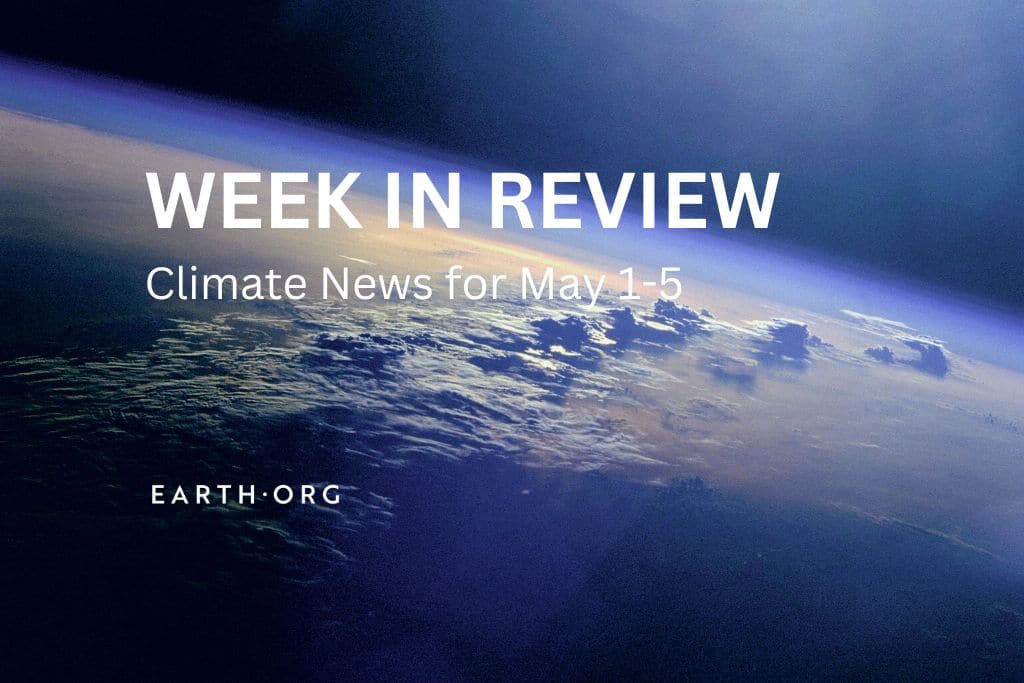This weekly round-up brings you key climate news from the past seven days, including COP28 chief Al Jaber’s speech at the Petersberg Climate Dialogue in Berlin and the planned agenda for November’s climate meeting, a new study on the long-term consequences of ocean warming, and ClientEarth’s latest legal action against agricultural giant Cargill.
—
1. COP28 Chief Al Jaber Calls for Phase-Out of Fossil Fuel Emissions, Promises to ‘Supercharge’ Climate Finance
The UN COP28 chief and head of the Abu Dhabi National Oil Company (ADNOC) Sultan Al Jaber has outlined a plan to “supercharge” global climate finance and finally deliver the long-awaited $100 billion to help developing nations adapt to climate change.
Speaking at the Petersberg Climate Dialogue in Berlin on Tuesday, the UAE’s president-designate of the upcoming UN climate conference urged wealthy nations to deliver on a commitment made 14 years ago to donate $100 billion per year from 2020 to developing countries that are particularly vulnerable to climate change to support their climate adaptation efforts.
Al Jaber also emphasised the need to phase out fossil fuel emissions, rather than production, by focussing on the development of new emission reduction technologies. This leaves the door open for the continued production and use of fossil fuels, which the United Arab Emirates (UAE), this year’s COP host, has repeatedly described as “key” components to a smooth energy transition. On multiple occasions, President Sheikh Mohammed bin Zayed al-Nahyan assured that the UAE would keep providing fossil fuels to countries around the world “for as long as the world needs it.”
2. April’s Record Ocean Warming Spike Could Signal Acceleration of Global Warming, Scientists Say
The ocean is warming quicker than ever, reaching record highs in April with huge temperature spikes in some regions, leaving scientists to figure out what it means and whether it forecasts a surge in atmospheric global warming.
According to the US National Oceanic and Atmospheric Administration (NOAA), the global sea surface hit an all-time high last month since satellite records began, beating the previous record of 21C set in 2016. The jump between early March and last week was almost two-tenths of a degree Celsius (0.36 degrees Fahrenheit).
A new study published last week found that the heat accumulated on Earth over the past 15 years, an amount almost equivalent to that of the previous 45 years, is rapidly warming the land, the cryosphere, the atmosphere, and especially the ocean, which stores about 89% of it. This, scientists say, has put the Earth’s climate system out of energy balance.
Read more here.
3. YouTube Under Fire for Running Ads That Reject Mainstream Climate Science on Videos With Over 73 Million Views
YouTube profits from ads on climate disinformation videos with tens of millions of views, despite Google updating its monetisation policies on climate change more than a year ago, a new study has found.
The new research by the Climate Action Against Disinformation (CAAD) coalition and the Center for Countering Digital Hate (CCDH) published earlier this week identified 200 examples of YouTube videos containing climate misinformation and disinformation, which collectively serve ads to over 73 million viewers.
The results are proof that Google, one of the world’s largest companies with a market value of US$863.2 billion, is breaking its promise not to profit from ads that reject mainstream climate science. In October 2021, the company updated its existing rules on ads on climate change by introducing a new monetisation policy for Google advertisers, publishers, and YouTube creators that would “prohibit ads for, and monetisation of, content that contradicts well-established scientific consensus around … climate change.”
Read more here.
4. Agricultural Giant Cargill Faces Legal Action Over Deforestation and Human Rights Failings in Brazil
ClientEarth has filed a legal complaint against US-based agricultural giant Cargill over its failure to adequately deal with its contribution to soy-driven deforestation and human rights violations in Brazil.
The complaint is the first time the company – the largest privately held firm in the United States with annual revenue of $165 billion – will face legal action in the US related to its deforestation footprint in the Amazon rainforest, Atlantic Forest, and Cerrado savanna.
The environmental legal non-profit alleges that Cargill is not properly monitoring the vast quantities of soy it trades, handles at its ports, or ships to global markets to identify and eliminate links to deforestation and human rights abuses, breaching its legal due diligence responsibilities.
Read more here.

















